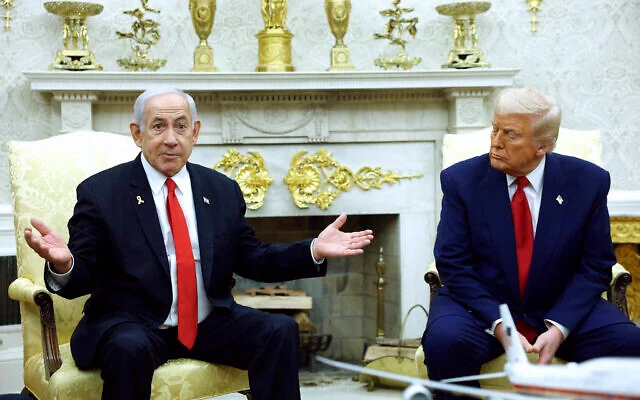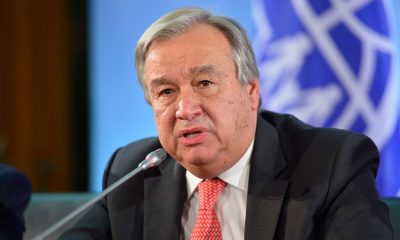Editor's Pick
Jury Finds Trump Guilty on All 34 Felony Counts in Landmark Trial

Former President Faces Up to Four Years in Prison Amidst Presidential Campaign
New York, May 31 (WARYATV) – In a dramatic and unprecedented legal battle, former U.S. President Donald Trump has been found guilty on all 34 felony counts by a New York jury. The verdict, which came after two days of deliberation, marks the first time an American president has been criminally convicted, casting a shadow over Trump’s 2024 presidential campaign.
The charges stem from allegations that Trump illegally tried to influence the outcome of the 2016 election by falsifying business records to cover up a hush money payment to adult-film actress Stormy Daniels. Trump, 77, who is the leading Republican candidate for the 2024 election, now faces the possibility of probation or up to four years in prison.
The 12-member jury delivered the unanimous verdict after a trial that spanned over several weeks. Trump, who had been dismissive and defiant throughout the proceedings, showed little emotion as the verdict was read. However, outside the courtroom, he expressed outrage, calling the decision “a disgrace” and vowing to continue his fight.
“This is long from over,” Trump told reporters, with a tensed jaw and somber expression. On his Truth Social platform, he declared, “My civil rights have been totally violated with this highly political, unconstitutional, and election interfering witch hunt. Our failing nation is being laughed at all over the world!”
Trump’s sentencing is scheduled for July 11, just days before the Republican National Convention where he is expected to be formally nominated as the party’s candidate for the 2024 election. His defense team, led by Todd Blanche, has vowed to appeal the conviction, arguing that the trial was influenced by political bias.
Despite the conviction, there is no constitutional prohibition against Trump running for or becoming president as a convicted felon. This legal ambiguity leaves the door open for Trump to continue his campaign, potentially setting the stage for a highly contentious election.
While President Joe Biden has refrained from commenting on the verdict, his campaign team quickly issued a statement urging voters to ensure Trump does not return to the Oval Office.
“Donald Trump has always mistakenly believed he would never face consequences for breaking the law for his own personal gain,” the Biden campaign said. “But today’s verdict does not change the fact that the American people face a simple reality. There is still only one way to keep Donald Trump out of the Oval Office: at the ballot box.”
The trial, which began in mid-April, saw Trump frequently flouting a gag order imposed by New York Supreme Court Justice Juan Merchan. The former president was found in contempt of court ten times and fined $10,000 for disparaging prospective witnesses and criticizing the judge and prosecutor Alvin Bragg.
The prosecution’s case hinged on the testimony of Michael Cohen, Trump’s former lawyer and fixer, who described how Trump directed him to pay $130,000 to Daniels to prevent her from going public with her allegations just days before the 2016 election. Cohen testified that Trump reimbursed him through a series of falsified business records, which were the basis for the 34 felony charges.
This verdict comes as Trump faces three other indictments, including charges related to his efforts to overturn the 2020 election results. However, the New York case may be the only one resolved before the 2024 election due to ongoing legal battles in the other cases.
The trial has highlighted the lengths to which Trump allegedly went to protect his personal and political interests, raising serious questions about his conduct and fitness for office. Despite this, Trump’s base remains largely supportive, viewing the trial as a politically motivated attack.
In typical fashion, Trump has used the trial to galvanize his supporters and raise funds for his campaign. Shortly after the verdict, his campaign sent out a fundraising email declaring, “I am a political prisoner!” Trump has consistently portrayed himself as a victim of political persecution, a narrative that resonates strongly with his loyal followers.
The guilty verdict against Donald Trump is a watershed moment in American legal and political history. It underscores the deep divisions in the country and the extraordinary challenges facing the U.S. political system. As Trump appeals the conviction and continues his presidential campaign, the nation braces for a tumultuous and contentious election cycle, with the former president’s legal troubles casting a long shadow over the democratic process.
Editor's Pick
Trump Derails Israeli Strike on Iran: Diplomatic Gamble or Strategic Blunder?

Trump rejects Netanyahu’s war plan, pushes for nuclear talks with Tehran — as Israeli frustration boils.
In a dramatic Oval Office split, Trump shut down a joint Israeli-US strike on Iran’s nuclear sites, triggering outrage in Jerusalem. Is diplomacy a delay tactic—or disaster in the making?
President Donald Trump may have just triggered the biggest rift in US-Israel defense cooperation since the Obama years. According to a bombshell NYT report, Trump personally blocked a fully coordinated Israeli strike package on Iran’s nuclear infrastructure—just weeks before it was set to launch. Israel was prepped. US CENTCOM was involved. Commando units were shelved in favor of all-out bombing runs. But in the final hour, Trump torpedoed the plan and launched direct talks with Tehran instead.
Sources say Netanyahu was blindsided. The visit to Washington, publicly framed around tariffs, quickly turned sour when Trump dropped the bombshell: no military support while diplomacy is on the table. Inside the Oval Office, the tension was visible. Outside, it was electric. Israeli officials saw betrayal. Netanyahu wanted a Libya-style disarmament. Trump? He’s chasing a legacy—an Iran deal to rival Obama’s failed JCPOA.
Back home, Israeli defense analysts are livid. “This was the moment,” one senior IDF figure told WARYATV. “We had operational superiority, regional support, and Iranian air defense already degraded. Now we’re talking again?” Meanwhile, Iran is stalling with a smile. The next round of nuclear talks resumes Saturday in Oman. Tehran already knows the game: negotiate, delay, enrich. By the time diplomacy fails, the uranium is already spinning.
Trump’s team is divided. Vance and Witkoff want to avoid war. Rubio and Waltz say it’s now or never. Meanwhile, Israel may be forced to go solo—and they’re watching those B-2s parked in Diego Garcia very closely.
What’s clear? This isn’t just another missed opportunity. It’s a high-stakes gamble that could reshape the Middle East—for better or for catastrophe.
Commentary
China Slaps Trump With Brutal Reality Check as Trade War Turns Global

Chinese state media blasts Trump’s tariff war, accuses U.S. of freeloading on globalization while Xi strengthens Asian alliances.
China lashes out at Trump’s economic nationalism, accusing the U.S. of hypocrisy as global trade realigns. Rare earths, aircraft, and semiconductors are next in this economic war.
Beijing just turned up the heat—and made it personal.
China Daily, the official mouthpiece of the Chinese Communist Party, has delivered a scathing editorial aimed squarely at Donald Trump, telling him to “stop whining” and stop pretending the U.S. is a victim of global trade. “The U.S. is not getting ripped off by anybody,” it declared. “It has been taking a free ride on globalization for decades.”
The insult isn’t just rhetorical—it’s strategic. Trump’s aggressive tariff campaign, which now includes up to 145% duties on Chinese imports, has sparked the fiercest economic duel in decades. But China isn’t retreating. Instead, it’s choking U.S. exporters and fueling regional alliances that sideline Washington altogether.
Xi Jinping’s surprise regional tour, now overlapping with this tariff escalation, is no coincidence. Xi is quietly building what he calls a “strategic alliance of destiny” with Malaysia and ASEAN countries. Translation: Beijing is done playing by Trump’s rules. While the U.S. ratchets up tariffs and threatens new probes into semiconductors, pharma, and rare earths, China is reinforcing control of critical global supply chains.
The stakes? Massive. The Hong Kong postal service just banned packages to the U.S., Boeing deals are stalling, and Chinese firms are moving supply lines away from American manufacturers. Rare earth export bans are already shaking markets, and Beijing’s shadow diplomacy is redrawing global trade corridors.
Trump says, “The ball is in China’s court.” But Beijing just spiked it—with force.
Bottom line: This is not just a trade war. It’s a global economic realignment. And China’s message to the world? America’s time as the global economic sheriff is over—and it has only itself to blame.
Editor's Pick
After USAID Collapse, EU Can’t Fill the Void: Poor Nations Face a Humanitarian Blackout

As Trump freezes $40B in foreign aid, Europe retreats too—fragile states brace for famine, failed states, and forgotten crises.
With USAID frozen and EU aid budgets slashed, NGOs warn of a coming storm. Displaced millions, collapsing health systems, and donor silence mark the next phase of global humanitarian collapse.
What happens when the world’s biggest aid donors pack up and walk away? We’re about to find out.
The U.S. withdrawal from international aid under Trump’s second term has already gutted dozens of life-saving programs, slashing $40 billion in funding in 90 days and sending shockwaves through NGOs like the Danish Refugee Council (DRC). But Europe isn’t rushing in to fix the fallout—it’s retreating too.
EU countries from Germany to France, Italy and Spain are scaling down their aid commitments, with Berlin alone axing €2.6 billion in just two years. The UK, once a flagship donor, is forecast to sink to a record-low 0.23% of GNI on aid by 2027. Humanitarian funding is collapsing just as global displacement is projected to hit nearly 130 million by 2026.
The result? A growing vacuum of care in conflict zones, climate disaster areas, and fragile states—places like Afghanistan, Sudan, Cameroon, where water, food, and medicine are now disappearing overnight.
NGOs are bleeding out. The DRC alone has already laid off 1,400 staff and warned 2 million people will go unreached. In one stroke, internally displaced Afghans have lost access to clean water. Malnutrition efforts are collapsing. And minefields go uncleared in Colombia.
Even the EU’s much-hyped Global Gateway initiative—the answer to China’s Belt and Road—is too profit-driven to touch the most desperate places.
And while Western leaders posture about controlling migration, terrorism, and instability, they’re gutting the only tools that actually prevent it: resilience-building, gender rights, democracy support, and grassroots aid.
The U.S. is leading this charge backwards, and the EU is not far behind. What’s being left behind isn’t just budget lines—it’s millions of lives on the brink.
Editor's Pick
Shin Bet Chief to Quit Anyway—Even as Israel’s Supreme Court Says No

Ronen Bar plans to resign despite top court order to stay, as Netanyahu faces rising backlash over intelligence failures and Qatari backchannel scandal.
Shin Bet head Ronen Bar defies Supreme Court order and prepares to resign amid political firestorm and probe into Netanyahu aides’ Qatari ties. Israel’s intelligence chaos deepens.
In a bold defiance of Israel’s highest court, Shin Bet chief Ronen Bar is planning to walk away—court ruling or not.
Despite the Supreme Court’s injunction demanding he stay in office until April 20, Bar has reportedly told close allies he’s done. The controversy around his post, he argues, is doing real harm to the agency’s core mission: intelligence and national security. That’s why, according to Channel 12, Bar will soon submit his resignation in writing, stating when he intends to leave, whether the government likes it or not.
But this isn’t just about one man leaving his post.
This is a political firestorm with national security consequences. Prime Minister Netanyahu moved to fire Bar weeks ago, citing “confidence issues.” But critics say the move reeks of political self-preservation. Shin Bet is currently investigating Netanyahu’s own aides over potential illicit ties to Qatar during sensitive diplomatic dealings—raising the specter of conflict of interest and interference.
Observers believe Netanyahu is scapegoating Bar to deflect blame for the catastrophic intelligence failures that preceded October 7, 2023—the day Hamas launched its devastating assault. And with Bar resisting the optics of being the fall guy, Israel’s intelligence community is now caught in a dangerous limbo.
This is no longer just about an agency chief. This is about the integrity of Israel’s national security—and whether the rule of law still holds in a government spiraling toward crisis.
Editor's Pick
Somalia Declares War with Words: Recognizes SSC-Khaatumo, Sparks Sovereignty Showdown with Somaliland

Barre’s Las Anod visit escalates tensions as Mogadishu officially absorbs SSC-Khaatumo, redrawing the map and triggering a furious response from Hargeisa.
Somalia’s recognition of SSC-Khaatumo as a federal state ignites diplomatic warfare with Somaliland, which calls the move a blatant breach of sovereignty.
What Somalia just did in Las Anod is nothing short of a diplomatic land grab.
In a public ceremony staged in the heart of Somaliland-controlled Las Anod, Somali Prime Minister Hamza Abdi Barre formally recognized SSC-Khaatumo as a federal member administration—a political act that Somaliland’s leadership considers a declaration of war.
“This is not a contested area,” Barre proclaimed, erasing decades of self-governance and territorial control exercised by Hargeisa. But behind the polished rhetoric lies a strategic offensive to reassert Somali federal power in the north—one backed by foreign defense deals, oil ambitions, and electoral manipulation.
SSC-Khaatumo’s leader Firdhiye, once a marginal actor, is now being handed a seat at the high-stakes National Consultative Council (NCC)—Mogadishu’s premier political forum. His inclusion signals Somalia’s intent to institutionalize the partitioning of Somaliland from within.
Barre didn’t come empty-handed. He came with funding promises, construction blueprints, and federal flags—launching new buildings, police HQs, and ID centers. This isn’t development—it’s occupation by bureaucracy.
Somaliland responded with fury, calling the move a blatant violation of sovereignty. And they’re right to sound the alarm. Because if SSC-Khaatumo’s “recognition” is allowed to stand, then the map of Somaliland could be erased by decree—not by war.
But there’s a legal twist. Somalia’s own provisional constitution requires a structured vetting process, which SSC-Khaatumo has not completed. There’s been no parliamentary ratification, no public consultation, no legal framework—just political theatre in a city under dispute.
The timing is no accident. Recognition of Somaliland is gaining steam internationally. This move is Somalia’s desperate attempt to block it—and to insert chaos into Hargeisa’s clearest shot at statehood in 30 years.
Barre’s visit to Las Anod wasn’t just political—it was tactical. Now Somaliland must decide: respond diplomatically—or prepare for a deeper confrontation.
Editor's Pick
Somaliland’s Foreign Ministry Faces Fire Over Turkish Ties, Las Anod Silence

Outrage erupts after Somaliland’s MFA entertains Turkish diplomats and fumbles response to Somalia PM’s Las Anod invasion—citizens demand answers, not excuses.
The Somaliland Ministry of Foreign Affairs is under fire after hosting Turkey’s ambassador and failing to deliver a clear response to Somalia’s Las Anod provocation. Public backlash explodes online.
What do you call a government that welcomes its enemy, excuses its occupier, and gaslights its own people? Somalilanders are asking just that.
After Somalia’s Prime Minister Hamse Barre walked unchallenged into Las Anod—deep in Somaliland territory—the Ministry of Foreign Affairs didn’t condemn it as an act of war. Instead, it hosted foreign diplomats for tea and soft words.
And the public? Exploded.
A statement from the ministry’s Director General, claiming to have briefed diplomats on Somaliland’s “position,” triggered a wave of public fury. Comments flooded in within minutes. The message wasn’t defiance—it was defeat dressed in diplomacy.
“Why are you dealing with NGOs instead of international legal experts?”
“This was not a visit—it was a violation of sovereignty!”
“Turkey is Somaliland’s number one enemy—why are you welcoming them in Hargeisa?”
The backlash is louder than ever. Somalilanders are done watching a weak MFA posture in the face of aggression. Many blasted the ministry’s engagement with Turkey, citing Ankara’s recent military agreements with Mogadishu, its support for drone strikes, and its outright refusal to acknowledge Somaliland passports.
It wasn’t just symbolic—the Turkish Ambassador to Somalia was received in Hargeisa. A man whose title literally erases Somaliland’s existence. Citizens are now calling for the closure of the Turkish consulate, the expulsion of Turkish officials, and a complete freeze in trade with Ankara.
Meanwhile, the ministry’s own credibility is in shambles. Earlier promises that the U.S. would stop Hamse’s trip? Never happened. Contradictory messaging and confusion over diplomatic status of ambassadors in Mogadishu? Still unresolved.
A senior Somaliland diplomat, writing on WARYATV, didn’t mince words:
“Turkey isn’t a neutral partner. It’s a declared enemy. Somaliland is being treated with disrespect, and this ministry is asleep.”
The people are angry, and the MFA is on trial—digitally, politically, and diplomatically. If Somaliland wants recognition, it needs more than polished statements. It needs courage, strategy, and unshakable clarity.
Because in the battle for sovereignty, words matter—and silence is betrayal.


Editor's Pick
Elon Musk’s Chainsaw Diplomacy: The Misguided Wrecking Ball at USAID

Tibor Nagy slams Musk’s chaos-first reforms, warns that gutting USAID risks U.S. diplomacy, credibility, and global influence.
Former top U.S. diplomat Tibor Nagy blasts Elon Musk’s abrupt shutdown of USAID as reckless “chainsaw” policy that hurt diplomacy, endangered lives, and delighted America’s enemies.
Elon Musk’s “Department of Government Efficiency” (DOGE) isn’t reforming America’s foreign policy machinery—it’s dismantling it with a flamethrower. And few know that better than Ambassador Tibor Nagy, the veteran diplomat who returned to the U.S. State Department just in time to watch Musk’s bureaucratic arson gut USAID, America’s global aid engine, overnight.
Instead of reform, we got a reckless, performative purge. Musk’s infamous tweet—“spent the weekend feeding USAID into the woodchipper”—wasn’t satire. It was policy. What followed was pandemonium: tens of thousands of aid workers stranded, contracts torched, food shipments halted, and emergency programs thrown into limbo. And for what? To satisfy a tech billionaire’s warped fantasy of government “efficiency” by humiliation and demolition.
Let’s be blunt: USAID has issues—bloated project pipelines, tangled chains of command, mixed priorities between diplomacy and development. But it also saves millions of lives, responds to famines and disasters, and builds long-term goodwill in fragile regions. It is not a place for “creative destruction”—it is the thin line between chaos and order in much of the world.
The collapse hit hardest in places like West Texas, where humanitarian logistics provider Breedlove found itself paralyzed. This wasn’t just a foreign affair—it was a domestic crisis too. Farmers, freight firms, contractors, and communities reliant on USAID’s global humanitarian machine were blindsided. Only after chaos erupted did State Department leadership step in to reanimate the programs Musk had gleefully killed.
Secretary of State Marco Rubio is now left flying blind, trying to project American leadership while the diplomatic engine is in pieces. As Nagy wryly notes, it’s not so much “flying while the engine is on fire” as rebuilding the engine midair during a nosedive.
Let’s be clear: America can’t afford Musk’s reckless improvisation in diplomacy. The world sees it as instability, unseriousness, and abandonment. Our adversaries—from Beijing to Mogadishu—see it as opportunity.
Reform is necessary. But it must be surgical, not suicidal. Strategic, not symbolic. And above all, it must serve U.S. interests, not viral tweets.
Editor's Pick
Amarre: The Scholar-Statesman Ready to Redefine Somaliland’s Future

From global summits to grassroots change, Mohamed Amarre stands as the bold, competent leader Somaliland’s Parliament needs in 2026.

Mohamed Yusuf Nuur Amarre
A respected academic, advisor, and civil leader, Mohamed Amarre blends global insight with community action—making him the most prepared candidate for the House of Representatives in Maroodijeex and Hawd.
In a political landscape often overwhelmed by slogans and short-term gains, Mohamed Yusuf Nuur Amarre offers something revolutionary: substance. His candidacy for Somaliland’s House of Representatives is not just timely—it’s necessary.

Mohamed Yusuf Nuur Amarre
Amarre is not your typical politician. He is a scholar, a technocrat, and a community builder with a rare ability to straddle boardroom diplomacy and village advocacy. With a portfolio that includes academic tenure, international diplomacy, and public health leadership, he is the kind of hybrid leader Somaliland desperately needs at this pivotal moment.

Mohamed Yusuf Nuur Amarre
From Edna University to global stages in Washington and Miami, Amarre has tirelessly promoted Somaliland’s image, branding the unrecognized nation with both dignity and vision. His firm, Hiraal International Consulting, has already helped over 200 professionals engage with international platforms—creating a rare and powerful network of Somaliland ambassadors abroad.
Yet, it’s not just international accolades that define Amarre’s campaign. His footprint in Hawd and southern Maroodijeex is legendary. From spearheading health initiatives to mentoring young minds in Somaliland’s universities, he’s earned credibility the hard way—through service, not speeches.

Mohamed Yusuf Nuur Amarre
In an era where Somaliland seeks both recognition and internal reform, electing Mohamed Yusuf Nuur Amarre sends a signal: Somaliland is ready to level up. Not just in rhetoric, but in reality. His campaign is powered by honesty, competence, and knowledge—three values that have long been in short supply in East African politics.
In short, this is not just another campaign—it’s a movement. One driven by clarity of purpose and an unmatched resume of results. The 2026 elections must not be about tribal arithmetic or old loyalties. They must be about vision and viability.
So, Maroodijeex and Hawd, the choice is yours: cling to the past or vote for the future.

Mohamed Yusuf Nuur Amarre
Vote Mohamed Yusuf Nuur Amarre. Lead Somaliland into a smarter, stronger, and globally engaged tomorrow.
-

 Analysis1 month ago
Analysis1 month agoSaudi Arabia’s Billion-Dollar Bid for Eritrea’s Assab Port
-

 ASSESSMENTS3 weeks ago
ASSESSMENTS3 weeks agoOperation Geel Exposes the Truth: International Community’s Reluctance to Embrace Somaliland as a Strategic Ally
-

 Somaliland3 months ago
Somaliland3 months agoSomaliland and UAE Elevate Ties to Comprehensive Strategic Partnership
-

 Africa1 year ago
Africa1 year agoHow Somaliland Could Lead the Global Camel Milk Industry
-

 Analysis1 year ago
Analysis1 year agoIran escalates conflict, attacking Israel; US forces help Israel to intercept Iranian projectiles
-

 Top stories11 months ago
Top stories11 months agoGunmen Kill 11 in Southeastern Nigeria Attack, Army Reports
-

 Analysis1 year ago
Analysis1 year agoIsrael and Iran on Edge: Tensions Escalate Amidst Rising Threats
-

 TECH11 months ago
TECH11 months agoZimbabwe Approves Licensing of Musk’s Starlink Internet Service





























